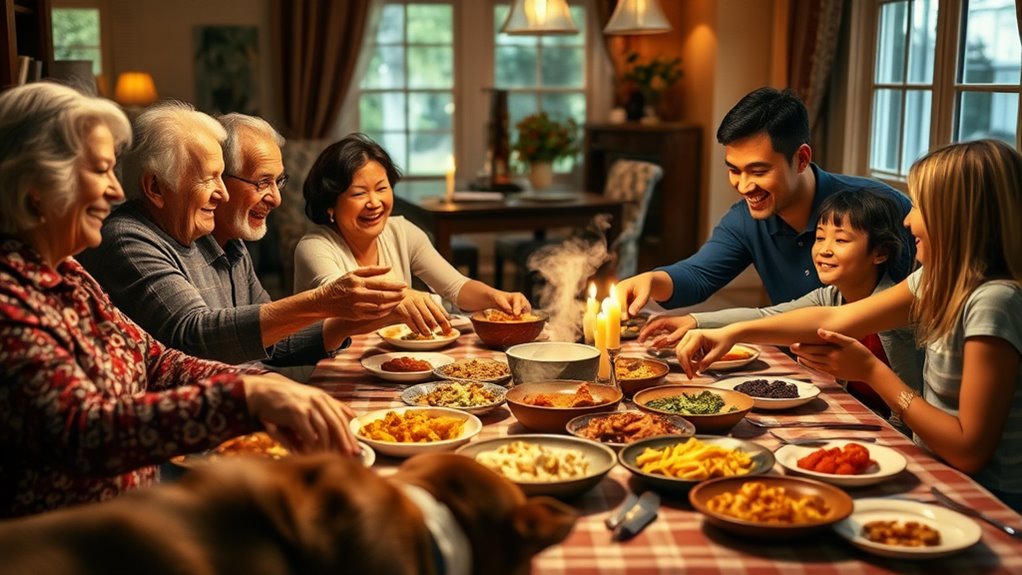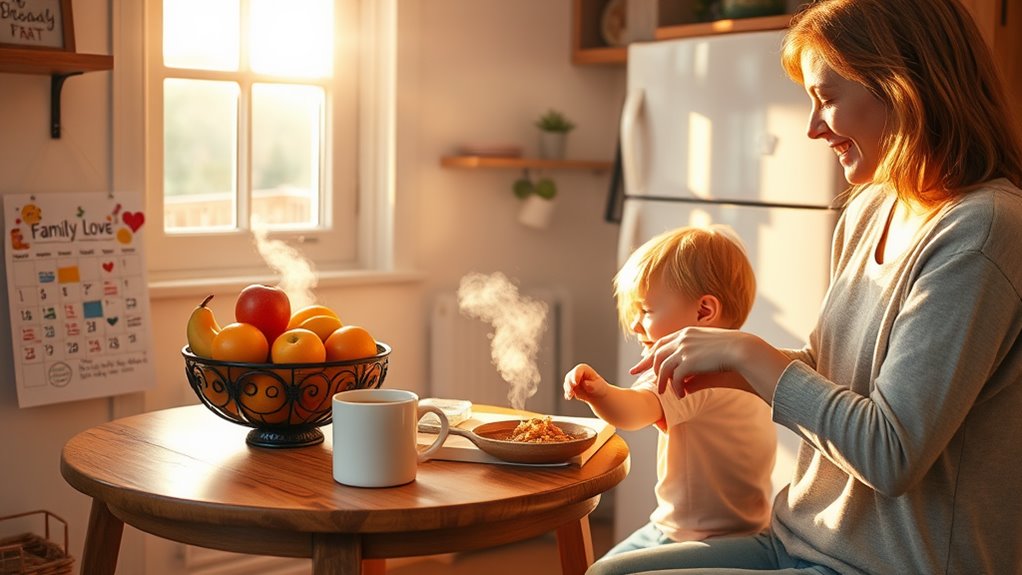Why Family Dinner Time Is the Secret to Stronger Bonds
Family dinner time is the heart of stronger relationships. It’s where you gather to share experiences, building a sense of belonging. These meals encourage open communication, letting everyone express thoughts and feelings freely. You’ll create lasting memories filled with laughter and stories, all while nurturing family traditions. Plus, you’ll promote healthy eating habits together, teaching younger generations the importance of nutrition. By making family dinners a priority, you strengthen emotional connections and create a safe space for support. If you want to discover more ways to enrich your family bonds, there’s plenty more to explore.
Key Takeaways
- Family meals foster connection and tradition, strengthening family identity and bonds through shared experiences.
- Dinnertime promotes open communication, allowing all members to express thoughts and feelings freely.
- Regular shared meals create lasting memories and nostalgic moments that reinforce family ties.
- Consistent mealtime routines provide emotional safety and stability, enhancing emotional connections among family members.
- Involving everyone in meal planning encourages healthy eating habits and models positive behaviors for future generations.
Importance of Family Meals
Family meals are often overlooked, but they play a crucial role in strengthening family bonds. When you gather around the table, you’re not just sharing food; you’re creating a space for connection and tradition.
Think about the cultural significance of meals in your family. Each dish may carry stories, memories, and values that shape your identity.
Moreover, making time for family dinners helps improve your time management skills. It encourages you to prioritize what’s truly important—your loved ones. By setting aside this time, you’re intentionally fostering relationships and ensuring that everyone feels valued and heard.
In today’s fast-paced world, it’s easy to let schedules dictate your family interactions. But when you commit to regular meals together, you create a rhythm that promotes unity and understanding.
It’s during these moments that you can discuss your day, share laughter, and support one another, reinforcing the family ties that matter most.
Enhancing Communication Skills
Gathering for meals not only strengthens bonds but also enhances communication skills among family members. During these moments, you can cultivate an environment that encourages active listening and open dialogue. By engaging in discussions around the dinner table, you help everyone express their thoughts and feelings more freely.
Here are three ways family dinners improve communication skills:
-
Encouraging Participation: Everyone gets a chance to share their day, fostering a sense of inclusion and respect for each other’s opinions.
-
Practicing Active Listening: You learn to listen without interruption, which demonstrates to your family that their thoughts matter. This skill translates well beyond the dinner table.
-
Building Confidence: Regularly speaking in a supportive environment helps family members express themselves more confidently, making it easier to tackle difficult conversations outside of mealtime.
As you prioritize these gatherings, you’re not just enjoying a meal; you’re nurturing essential communication skills that strengthen relationships.
Building Lasting Memories
Sitting down for dinner creates a perfect opportunity to build lasting memories that you and your loved ones will cherish for years to come. Each meal is more than just food; it’s a time for shared experiences that strengthen your family’s bond.
You might recall that one dinner when your youngest tried to tell a joke but ended up mixing up the punchline. Those laughter-filled moments become nostalgia moments, a treasure chest of memories that you can revisit together.
As you gather around the table, you share stories from your day, and each anecdote becomes a thread in the tapestry of your family history. These stories can spark future conversations, helping to reinforce a sense of belonging.
You may even create traditions, like Taco Tuesday or Sunday roast, that give you something to look forward to each week.
Strengthening Emotional Connections
Sharing meals together not only creates memories but also fosters deeper emotional connections among family members. When you gather around the table, you’re not just sharing food; you’re sharing experiences, thoughts, and feelings.
This time offers a unique opportunity for relationship building and emotional support that can strengthen your family ties.
Here are three ways family dinners enhance emotional connections:
-
Open Communication: Regular meals allow everyone to share their day, thoughts, and feelings. This open dialogue fosters understanding and empathy among family members.
-
Shared Experiences: Whether it’s laughing over a funny story or supporting someone through a tough day, these shared moments build a sense of belonging and emotional safety.
-
Rituals and Traditions: Establishing routines around mealtime, like special dishes or themed dinners, creates a sense of stability and connection, reinforcing your family identity.
Encouraging Healthy Eating Habits
Family meals can play a pivotal role in encouraging healthy eating habits among all age groups. When you gather around the dinner table, it’s not just about sharing food; it’s also an opportunity for nutritional education. Involving everyone in discussions about the benefits of fruits, vegetables, and whole grains can help foster an appreciation for healthier choices.
Meal planning together is another effective way to promote these habits. By involving your family in the planning process, you can teach them how to create balanced meals. You’ll encourage them to think critically about their food choices and understand portion sizes.
Plus, it’s a great way to explore new recipes that include healthy ingredients. As you cook and share meals, you can model healthy eating behaviors, showing how enjoyable and satisfying nutritious foods can be.
When kids see you choosing vegetables and lean proteins, they’re more likely to follow suit. Remember, the more you engage in these practices as a family, the stronger those healthy habits will become, leading to a lifetime of better eating choices for everyone involved.
Creating Family Traditions
At the heart of every strong family lies a tapestry of traditions that deepen connections and create lasting memories.
Creating family traditions not only enriches your mealtime customs but also strengthens your bonds. These rituals serve as touchstones for shared experiences, allowing you to reflect on your family’s unique story.
To cultivate meaningful traditions, consider the following:
-
Weekly Family Nights: Set aside one evening a week for a family activity, whether it’s game night, movie night, or cooking together. These moments foster laughter and collaboration.
-
Seasonal Celebrations: Embrace seasonal events or holidays by creating specific customs, like a fall harvest dinner or a summer barbecue. These gatherings can build anticipation and excitement each year.
-
Daily Gratitude Rituals: Start or end your family meals by sharing something you’re grateful for. This simple practice can promote positivity and appreciation within your family.
Frequently Asked Questions
How Often Should Families Aim to Have Dinner Together?
You should aim for a weekly frequency of family dinners to strengthen connections. Meal planning can help ensure everyone’s available, making it easier to gather and enjoy quality time together amidst busy schedules.
What if Family Members Have Different Dietary Restrictions?
If family members have different dietary restrictions, it’s crucial to embrace dietary inclusivity in meal planning. You can create meals everyone enjoys by incorporating various ingredients, ensuring that each person feels valued and included at the table.
Are There Benefits to Having Family Breakfasts or Lunches Too?
Breakfast benefits can bloom like morning flowers, sparking energy for the day ahead. Lunch bonding, on the other hand, serves as a refreshing oasis, allowing you to share stories and laughter while nourishing your connections.
How Can Technology Impact Family Dinner Time?
Technology can significantly impact family dinner time by introducing digital distractions. If you allow too much screen time, it might hinder meaningful conversations and connections, making it harder for everyone to engage and bond during meals.
What Activities Can Enhance the Dinner Experience Further?
To enhance your dinner experience, consider creating dinner themes and cooking together. This not only makes the meal more enjoyable but also fosters teamwork and creativity, making your family time even more special and memorable.





